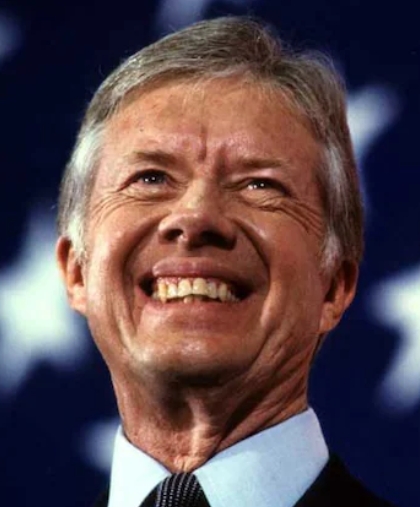 By Eric Rozenman
By Eric Rozenman
The eulogies offered at former President Jimmy Carter’s funeral earlier this month suffered from significant errors of omission. Prominent among them were those regarding his Arab-Israeli peace-making and relations with Jews and their state.
Speakers highlighted the 39th president’s mediation of the Egyptian-Israeli peace accord at Camp David in 1978. But how Egypt’s President Anwar Sadat and Israel’s Prime Minister Menachem Begin came to be at the presidential retreat in the first place went unmentioned.
Early in his term Carter proposed a grand international Middle East peace conference. The U.S. leader invited the Soviet Union, America’s Cold War adversary, to co-chair the gathering.
The prospect of Moscow co-directing a diplomatic circus that might impose a settlement so alarmed Jerusalem and Cairo that their representatives met secretly in Morocco to thwart it. Only when Begin and Sadat were ready for their countries to negotiate directly did they ask the United States to assist.
Diplomats and journalists credited Carter with working tirelessly to bring the talks to fruition. Too much credit, according to Israeli political science professor Gerald Steinberg. Steinberg’s 2019 book, Menachem Begin and the Israel-Egypt Peace Process, claims the American president “very strongly embellished his role” at Camp David while downgrading Begin’s.
That charge followed one by Kenneth Stein, a White House Middle East advisor to Carter and later Middle East Fellow at the Carter Center in Atlanta, that the ex-president’s 2006 bestseller, Palestine: Peace Not Apartheid, was “one-sided” and “meant to provoke. … Being a former President does not give one a unique privilege to invent information or to unpack it with cuts, deftly slanted to provide a particular outlook.”
Even before Begin and Sadat signed the accords, Carter began undermining the possibility that a formal peace between Israel and Egypt could grow into warm cooperation. He did so, in the view of Steinberg by pressing Israel to make concessions to the Palestinian Arabs and erroneously claiming Begin had agreed to a five-year instead of three-month settlement freeze.
This even though Yasser Arafat, head of the terrorist Palestine Liberation Organization, called the accords “a dirty deal,” Sadat a “traitor” and threatened Carter. Instead of joining peace-making efforts, the PLO by its rejectionism spurred other Arab countries’ opposition to such diplomacy and reinforced Egyptian public hostility to Israel.
Carter squinted at Israel through the distorting lens of Palestinian victimhood (largely self-imposed, the result of warring against Jewish equality and sovereignty in any portion of the Holy Land). The former Georgia governor’s fixation with Palestinian Arabs as America blacks in the Jim Crow South continued post-presidency. Carter simultaneously hardened his antipathy toward Israel and its supporters. He reportedly blamed them for his 1980 re-election loss to Ronald Reagan after receiving only a plurality, 45 percent, of the Jewish vote.
The most glaring example of Carter’s anti-Israel mendacity came with publication of Palestine, Peace Not Apartheid. Beyond the title’s incendiary suggestion of Israeli anti-Arab segregation, this screed contained several dozen major errors of fact, documented by the Boston-based Committee for Accuracy in Middle East Reporting and Analysis (CAMERA). These included assertions that:
*U.N. Security Council Resolution 242 requires Israel to withdraw from all land conquered in the 1967 Six-Day War,
*Israel’s West Bank (Judea and Samaria) security barrier separates Palestinian Arabs from each other rather than Palestinian terrorists from Israelis, and
*Hamas leader Ismail Haniyeh (whom Carter embraced in a 2009 visit to the Gaza Strip and Israel assassinated in 2024) did not repeatedly reject peace-making with Israel.
Carter insisted “everything in the book, I might say, is completely accurate.” However, the volume not only prompted the resignation of Stein from the Carter Center but also the public departure of 14 members of the center’s board of councilors. They charged the former president had “clearly abandoned your historic role of broker in favor of becoming an advocate for one side.”
Perversely, Carter continued attempting to insert himself into Arab-Israeli diplomacy as one of The Elders. These pompously named globe-trotters included Carter, former South African leader Nelson Mandela, Bishop Desmond Tutu, one-time Irish Prime Minister Mary Robinson, former U.N. Secretary General Kofi Annan and retired Algerian diplomat Lakdar Brahimi. As this writer pointed out at the time, only Annan approached even-handedness regarding Israel and its supporters versus Palestinian Arabs. Tutu in particular, Alan Dershowitz noted, “accused ‘the Jews’ of causing many of the world’s problems.”
So, of course Carter and Tutu co-authored an error-filled 2010 USA Today Op-Ed calling for a new approach to Middle East peace. This “new approach” rehashed previous Carter efforts casting Israel as the obstruction.
Remembered in full, James Earl Carter, Jr. was no saint.
- Like
- Digg
- Tumblr
- VKontakte
- Buffer
- Love This
- Odnoklassniki
- Meneame
- Blogger
- Amazon
- Yahoo Mail
- Gmail
- AOL
- Newsvine
- HackerNews
- Evernote
- MySpace
- Mail.ru
- Viadeo
- Line
- Comments
- SMS
- Viber
- Telegram
- Subscribe
- Skype
- Facebook Messenger
- Kakao
- LiveJournal
- Yammer
- Edgar
- Fintel
- Mix
- Instapaper
- Copy Link







One Response
Excellent piece…as far as it goes. There were a good many other significant negatives to his record, e.g., [https://www.nationalreview.com/2002/10/carterpalooza-jay-nordlinger-2/]. And there was a substantial amount of antisemitism to him too [https://www.jns.org/a-jimmy-carter-surprise-he-hated-jews-not-just-israel/].